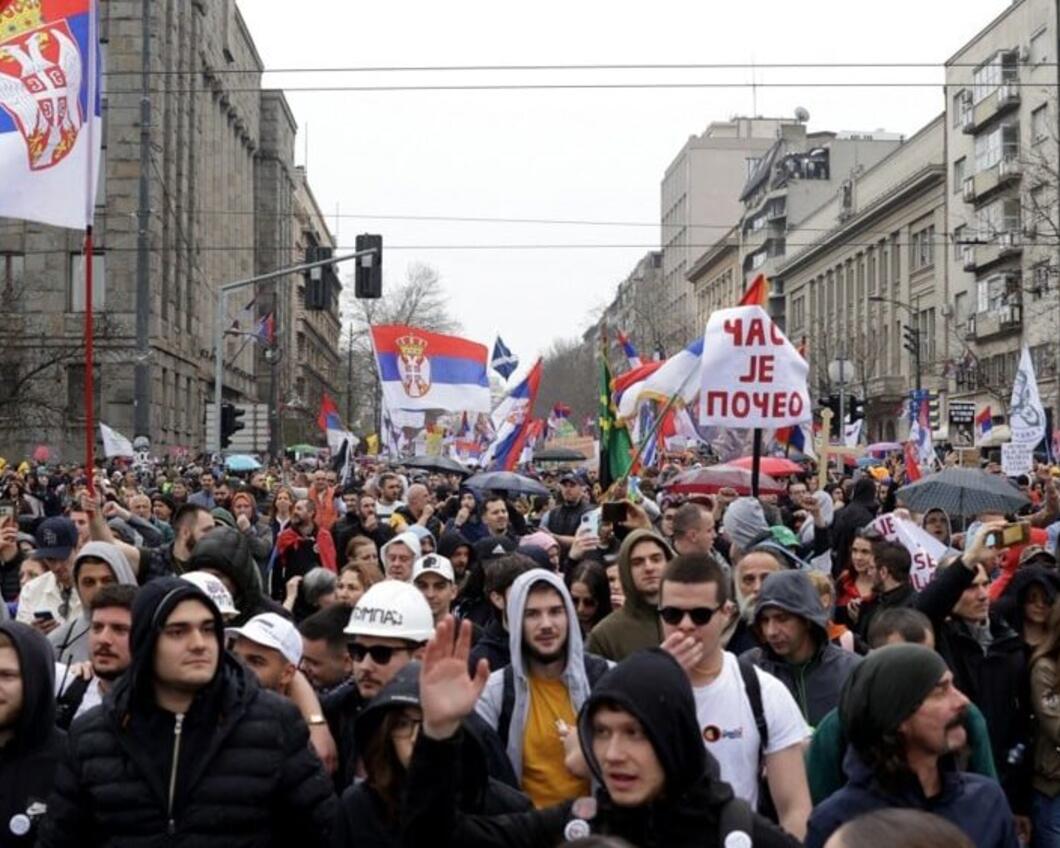On Wednesday the 1st of October, thousands of Serbians marched the streets reflecting 11 months of protest against the autocratic president Aleksander Vučić. Serbia has been rocked by eleven months of protest since the railway canopy collapse at the Novi Sad main station on November 1,2024, which claimed sixteen lives. Public outrage fueled by the belief that the disaster was a direct consequence of deep-seated corruption, rapidly escalated into demands for an end to President Aleksander Vučić’s rule and the immediate calling of new national snap elections. Furthermore, protesters demand transparent investigations, criminal prosecutions for those responsible for the canopy collapse, and a free media, a right they argue Vučić is actively attempting to stifle. The current unrest focuses sharply on the critical health of detained student Bogdan Jovičić, who conducted a hunger strike to protest the work of the court regarding his detainment.
President Vučić has denied the accusations of corruption and accused the protesters of working together with the West to sabotage his rule. He ignored the demands, opting instead to react with overwhelming police force. This aggressive response is not limited to street confrontations. Hundreds of people have been arrested, including numerous students, as well as university and high school professors. In a severe institutional crackdown, professors who supported the student movement have been arrested and replaced by individuals loyal to Vučić. Vučić himself has publicly dismissed the protesters as “terrorists” and has mobilized his Serbian Progressive Party (SNS) to organize counterdemonstrations to maintain his firm grip on power. While no major incidents were declared after these counterdemonstrations, brief scuffles were reported in the capital, Belgrade, where riot police pushed anti-government demonstrators away as Vučić joined his supporters.
Bogdan Jovičić, a student from the Faculty of Technical Sciences, was arrested after the protest on August 14. Jovičić began a hunger strike that lasted thirteen days to protest against the authorities. The authorities demonstrated their treatment of Bogdan when they handled the news and funeral arrangements following his father’s death. Bogdan found out about his father's passing days later and was only brought to the funeral at the last minute, shackled at his feet and hands. This inhumane treatment triggered his hunger strike. He was transferred to the Special Prison Hospital on September 17. After thirteen days, The Administration for the Execution of Criminal Sanctions announced the ending of the hunger strike and that he is now in good general condition. In response to his suffering, there have been many protests for his release and the release of all the detained protesters. Sunday the 21st of September, citizens choirs of Novi Sad organized a protest march demanding the release of Bogdan and all other political prisoners. Activists say they will continue protests until the president meets their demands.
Over the past weeks the situation has intensified with the confirmation that police used teargas, on September 5 against students, professors and citizens. Furthermore, the intimidation and threats keep increasing with Siniša Vučinić, a member of the Main Board of the Serbian Progressive Party openly discussing the murder of a student on Informer TV and professors and journalist receiving multiple death threats. These internal conflicts are hurting Serbia's image standing as an EU candidate country.
While Serbia’s candidate status remains unchanged, the attitude of the Serbian people is shifting. A growing number of protesters are increasingly critical of the European Union. This opposition stems from the belief that European institutions are making deals with Vučić and supporting highly controversial projects, primarily the Jadar lithium mining project. Since the European Commission recognized this destructive and unpopular project as one of strategic importance for the EU, many Serbian citizens perceive the EU as viewing Serbia solely through the lens of economic interest, rather than as a valuable equal partner that respects the citizens' values and its own values surrounding sustainability. While Vučić maintains contact with global autocrats, including Putin, whom he calls a strategic ally, these events are pushing Serbian citizens toward a more nationalistic stance. Protesters now seek an independent Serbia, free from corruption and undue influence from Russia and China, but also without the perceived interference of the EU. The contrast between Vučić's diplomatic visits to autocrats and domestic repression is damaging Serbia's image as an EU candidate country.
Oppositional forces such as the green-left opposition platform, Zeleno-Levi Front (ZLF) still see the path to European integration as the only viable option for Serbia. However, they argue that the EU must revise its strategy by exerting political pressure on Vučić and openly endorsing the protesters' demands, such as the release of students and support for new elections. The European Green Party (EGP), of which ZLF is a member, has been pushing the European People's Party (EPP) to act and put international pressure on the Serbian president, as SNS remains an associate member of the EPP. Moreover, ZLF specifically calls on European institutions to cease deals with Vučić, to enforce sanctions on high-ranking government officials and to stop supporting controversial projects, which they claim Vučić exploits to gather support for the wider public, like what happened when the European Commission recognized the Jadar lithium mining project, as a project of strategic importance for the EU. It remains to be seen whether Brussels will allow the escalating domestic repression to overshadow its current diplomatic relations with the Serbian leader.

